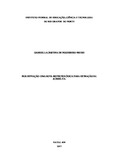Biolixiviação: uma rota biotecnológica para extração da scheelita

Visualizar/
Data
2017-08-23Autor
Freire, Gabriella Cristina de Figueiredo
http://lattes.cnpq.br/9266226993145109
Metadado
Mostrar registro completoResumo
Bacterial leaching, also known as bioleaching, has now been widely applied by the mineralmetallurgical
industry to treat various ores as well as to recover metals and tailings. This
technological route may be an alternative to the processing of scheelite tailings. The objective
of this study was to evaluate the application of a biotechnological route for the solubilization
of scheelite from pure samples and water from Brejuí mine located in Currais Novos-RN. The
Scheelite samples were submitted to the 250 ml Erlenmeyer bioleaching tests, subjected to
contact and temperature control in a Shaker incubator. Stirring was kept constant in all runs at
120 rpm. The behavior of the sheelite solubilization was analyzed in of mine water solution
with initial pH ranging between 2-5. The pH was corrected with sulfuric acid solution. The
leachates were filtered and the filter material subjected into a muffle at 700°C for 50 minutes.
The leached samples were collected for bacteriological analysis in Petri dish, to verify the
bacterial growth. The results show that there is a growth solubilization for the contact time
studied (120 h) for all pH ranges studied, as well as the bacteriological growth was not
stabilized. In this phase of the work, a 12% solubilization result was obtained. However, as the
microorganisms were not identified and the extraction curves were increasing, it is advisable
try to increase the contact time to maximize the leaching results.



